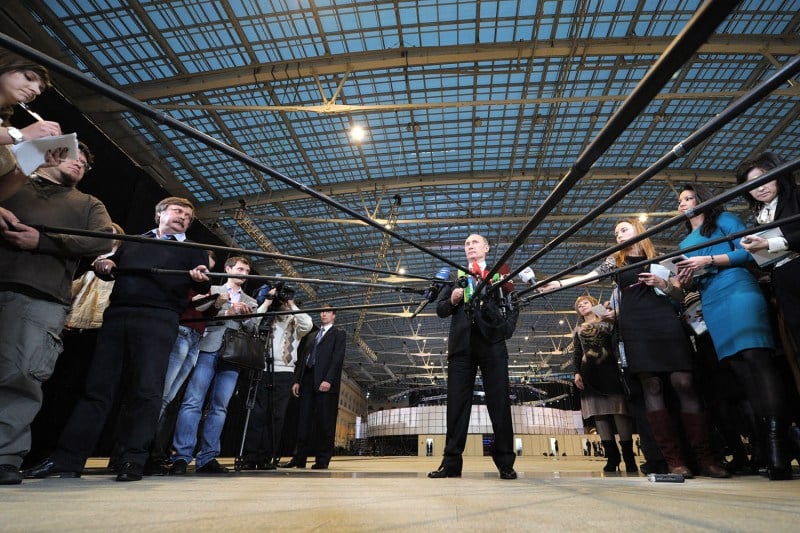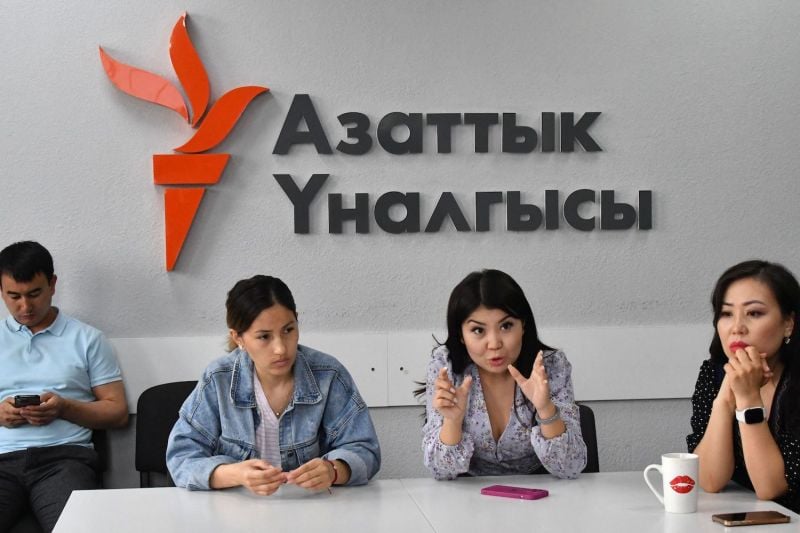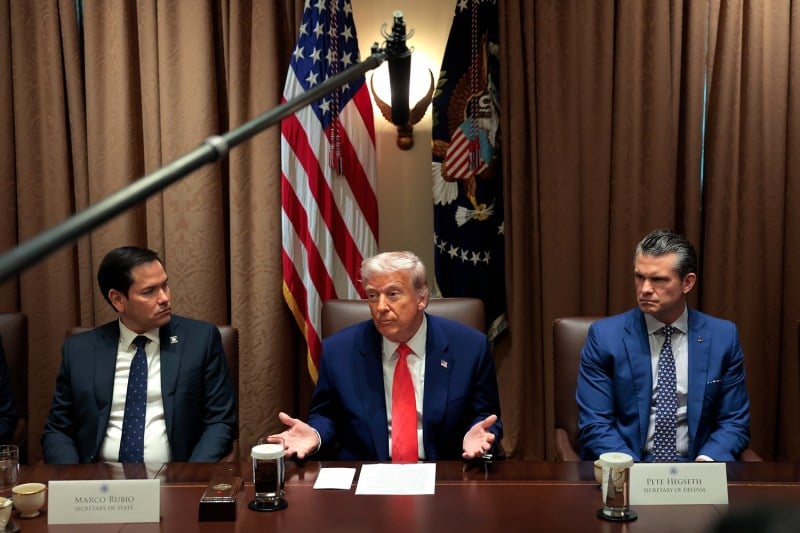A Dialogue With Russia’s Dark Side

A Dialogue With Russia’s Dark Side
A new book tries to understand the once-idealistic Russian journalists who now propagandize for Putin.
Journalists question Russian Prime Minister Vladimir Putin in Moscow, on Dec. 15, 2011. Alexei Druzhinin/AFP via Getty Images
What do you with former friends who end up on the dark side, who espouse political views that are anathema to you?
It has never been an easy question to answer. I fell out with several over the Iraq War, as they became cheerleaders for the misadventure. The acrimony was at least as bad with those who proselytized for Brexit. It must have been the same for the Vietnam War and for other great/terrible moments in history. But surely nothing compares to now, with the division between those who stand in a broad sense for liberal democracy and those who advocate for authoritarianism and its various nativist-populist offshoots.
What do you with former friends who end up on the dark side, who espouse political views that are anathema to you?
It has never been an easy question to answer. I fell out with several over the Iraq War, as they became cheerleaders for the misadventure. The acrimony was at least as bad with those who proselytized for Brexit. It must have been the same for the Vietnam War and for other great/terrible moments in history. But surely nothing compares to now, with the division between those who stand in a broad sense for liberal democracy and those who advocate for authoritarianism and its various nativist-populist offshoots.
Our Dear Friends in Moscow: The Inside Story of a Broken Generation, Andrei Soldatov and Irina Borogan, PublicAffairs, 336 pp., $30, June 2025.
For Americans, it was not easy during Donald Trump’s first term, but somehow people got by. The great exodus of liberals to Canada didn’t quite happen; the media continued to do its job. The president was restrained by the grown-ups in the White House. Now it is different. People are seeing their life’s work, everything they stand for, being destroyed.
Some Russians might allow themselves a wry smile. They’ve lived through such upheaval for nearly four decades. From the optimism of the late Gorbachev years to the collapse of Soviet Communism to the advent of Vladimir Putin’s presidency in 2000 and even for some years after that, they dared to believe that their new-found freedoms might last.
Central to that was a new type of journalism that included investigations about the past and present. I saw that for myself as a correspondent in Moscow in the first half of the 1990s. Military sites that had been closed were suddenly reopened. Archives were accessible. Officials and politicians were able to speak candidly to foreign and Russian reporters alike.
Andrei Soldatov and Irina Borogan were in their teens when the USSR collapsed. By the middle of 1990s, they were young reporters on a mission. The first newspaper to take them on was called Sevodyna (Today), and it was owned by an oligarch named Vladimir Gusinsky. The first group of post-Soviet super-rich were intoxicated by their sudden acquisition of wealth and were eager to flaunt their power and influence. Gusinsky’s main outlet was a TV station called NTV that broke the mold, challenging the Kremlin with fierce comment and intrepid investigation.
Soldatov and Borogan have spent their entire careers in journalism looking at the KGB and its successor organization, the FSB. In Sevodnya they found a willing publisher. As Putin consolidated his power, its editors became increasingly wary. Gusinsky was one of the first to be punished. He had his media outlets taken away, and he was driven out of Russia. At least he survived imprisonment or death.
In their compelling new book, Soldatov and Borogan chart the successes and travails of their investigations, through a series of newspapers who took them on and then dropped them. The story is partially a Russian take on the “journalists as good guys” trope that dates back to All the Presidents’ Men—with proprietors and editors being pushed and pulled in both directions. At the beginning, some of the authors’ pieces were published out of genuine journalistic integrity; sometimes they were let through to make the publication look open-minded, while the rest of its output was loyal to the power structures. Sometimes their reporting was diced and sliced. Other times it was rejected out of hand. They were repeatedly in and out of jobs.
The book is punctuated by the horrors of the Putin era. The calamities of his early years—the Nord-Ost theater hostage crisis, the Kursk submarine accident, and the Beslan school massacre—is followed by the succession of murders ordered by the Kremlin: Alexander Litvinenko, Anna Politkovskaya, Boris Nemtsov, Alexei Navalny.
Interspersed are rare moments of optimism, such as the hopes vested in Dmitry Medvedev, the prime minister who briefly swapped jobs with Putin. How absurd it is to recall that many Russian liberals and Western diplomats believed that, because he liked Apple products and was a fan of Deep Purple, Medvedev would usher in a different era. Now he is one of the most pernicious of them all—a so-called moderate who promised to abide by the rule of law now issuing florid threats about nuking European cities for supporting Ukraine.
The narrative is constructed around the authors’ relationship to half a dozen colorful characters, who first share their enthusiasm for journalistic enquiry, only to move over to the Putin cause. Some do it faster than others; others do it with more vehemence than others. All seemingly did so willing. In the early days, this group would gather at each other’s dachas or drink late into the night at Moscow’s new generation of bars and clubs, with names such as Duma (the name of Russia’s parliament) and Jean-Jacques. Then it turns sour, as Russian publications begin to reject their work and they felt under personal threat, but the authors insisted on staying in Russia until the dangers became too great.
Some of the poignant passages detail Andrei’s complicated relationship with his father, Alexey Soldatov. A prominent nuclear physicist in Soviet times, he introduced Russia’s first internet provider in 1990. Even though Alexey Soldatov was (surprisingly) appointed deputy minister of communications in 2008, he continued to fund his son’s journalism about the security services, so long as he confined himself to open-source material. “He knew what it was like to work with government secrets and how to calculate the risks,” the younger Soldatov writes. His ministerial tenure last only two years and, after a long disagreement with the Kremlin over its intentions to separate Russia’s domains from the global web, Alexei was arrested. Aged 72 and with a terminal illness, he was sentenced to a labor colony for “abuse of power,” where he languishes.
In exile in London, and with Andrei Soldatov declared a foreign agent in 2023, it has not been easy for the authors. They have persevered with their work and tried to keep up their contacts even from afar. For this, their latest project, they decided to track down their erstwhile colleagues to get a better idea of what led them to spout Kremlin propaganda.
The trigger was a commentary written by one of their peers, Petya Akopov. A week after Putin’s full-scale invasion of Ukraine, Akopov called on a government-owned website for “the solution of the Ukrainian problem”—the same term the Nazis used about the Jews. “How could that have happened?” the authors ask. “He had grown up in an intelligent family in a friendly environment, had gotten a good education and had married a woman he loved. His family was blessed with two daughters. How had he become so bloodthirsty?”
Soldatov and Borogan divided up between them the various text messages or emails they would send. “We didn’t know what their reactions would be, and we didn’t know how it might affect us,” they write. They couldn’t just go and see them; they were, after all, “on the opposite side of the wall.”
To their surprise, several were prepared to talk. (When they tried to get hold of one of them, Olga Lyubimova, Putin’s culture minister, they were invited to submit questions via the press office.) These conversations are revealing but a little too brief, featuring in the appendix of the book.
Do we get a better understanding of the propagndists’ motivations? For some it seems to be family ties, going back to Stalin’s time. For others, it was the belief that they could, to use an English expression, have their cake and eat it: They could propagandize for all-Russia nationalism while enjoying the luxuries afforded by homes in London and villas on the Cote d’Azur. That has now been denied them, but who is to say that, thanks to Donald Trump, it won’t all come back again?
Soldatov and Borogan do their best not to be judgmental, which isn’t easy in the circumstances. It would also be invidious to see the poacher-turned-menacing gamekeeper as a particularly Russian phenomenon.
Many a journalist in the West has been enticed to cross over onto the other side of the rope, not just to do the job of government spokesperson (nothing wrong in that) but to lie and threaten on behalf of their bosses. This gripping book juxtaposes the often difficult and lonely trade of investigative journalism with the allure of power, the desire to ingratiate, and the toxicity of grievance. It’s a very Russian story, but the human characteristics it describes are not confined to Russia.
Books are independently selected by FP editors. FP earns an affiliate commission on anything purchased through links to Amazon.com on this page.
John Kampfner is the author of Why the Germans Do It Better: Notes from a Grown-Up Country.
More from Foreign Policy
-

American flags are draped around tables and pipes in a small factory room as women work at sewing machines to produce them. Tariffs Can Actually Work—if Only Trump Understood How
Smart trade policy could help restore jobs, but the president’s carpet-bomb approach portends disaster.
-

Donald Trump looks up as he sits beside China’s President Xi Jinping during a tour of the Forbidden City in Beijing on Nov. 8, 2017. Asia Is Getting Dangerously Unbalanced
The Trump administration continues to create headlines, but the real story may be elsewhere.
-

Trump announces tariffs Trump’s Wanton Tariffs Will Shatter the World Economy
Economic warfare is also a test for U.S. democracy.
-

The Department of Education building in Washington, DC on March 24. Why Republicans Hate the Education Department
Broad popular support means that even Ronald Reagan failed at dismantling the agency.










Join the Conversation
Commenting on this and other recent articles is just one benefit of a Foreign Policy subscription.
Already a subscriber?
.
Subscribe
Subscribe
View Comments
Join the Conversation
Join the conversation on this and other recent Foreign Policy articles when you subscribe now.
Subscribe
Subscribe
Not your account?
View Comments
Join the Conversation
Please follow our comment guidelines, stay on topic, and be civil, courteous, and respectful of others’ beliefs.
Change your username |
Log out
Change your username:
CANCEL
Confirm your username to get started.
The default username below has been generated using the first name and last initial on your FP subscriber account. Usernames may be updated at any time and must not contain inappropriate or offensive language.